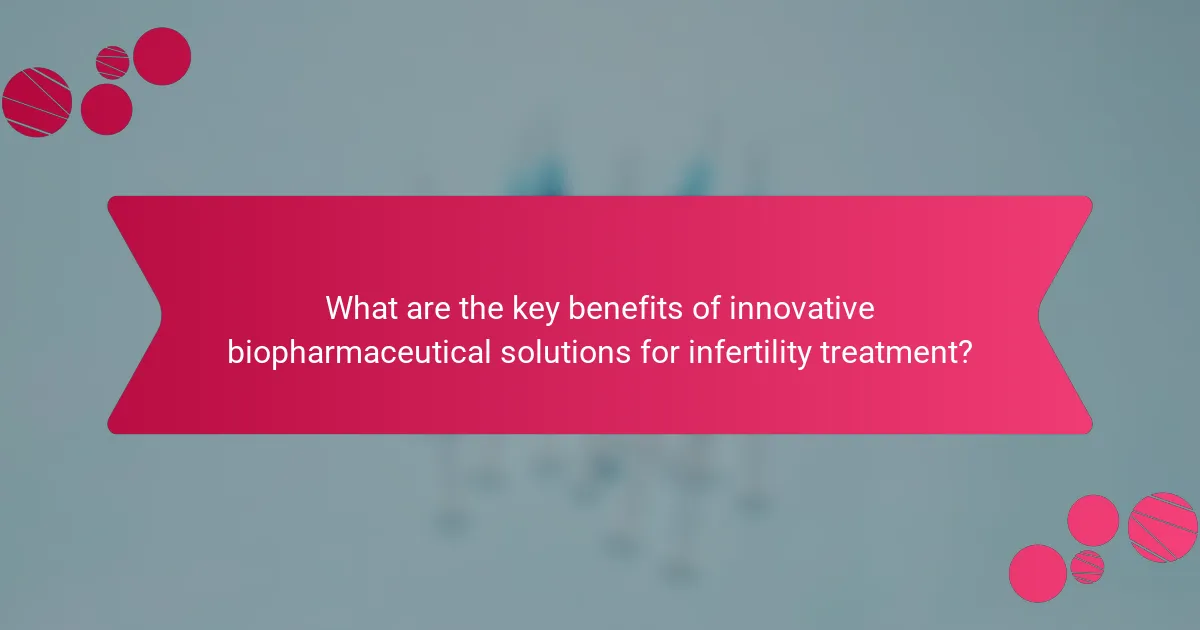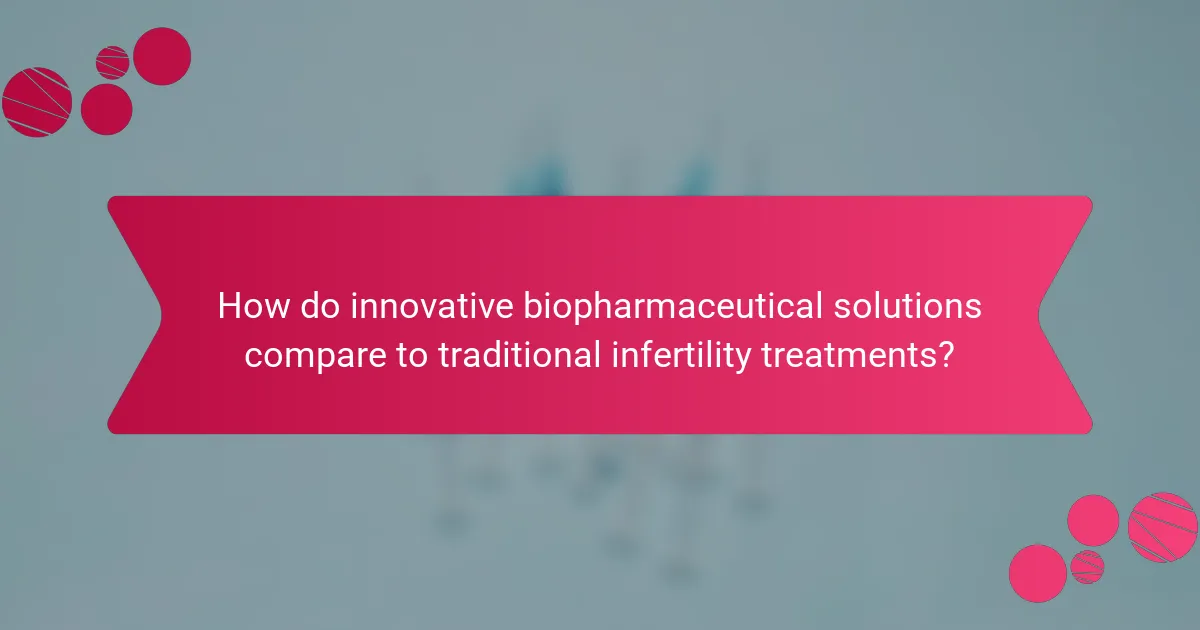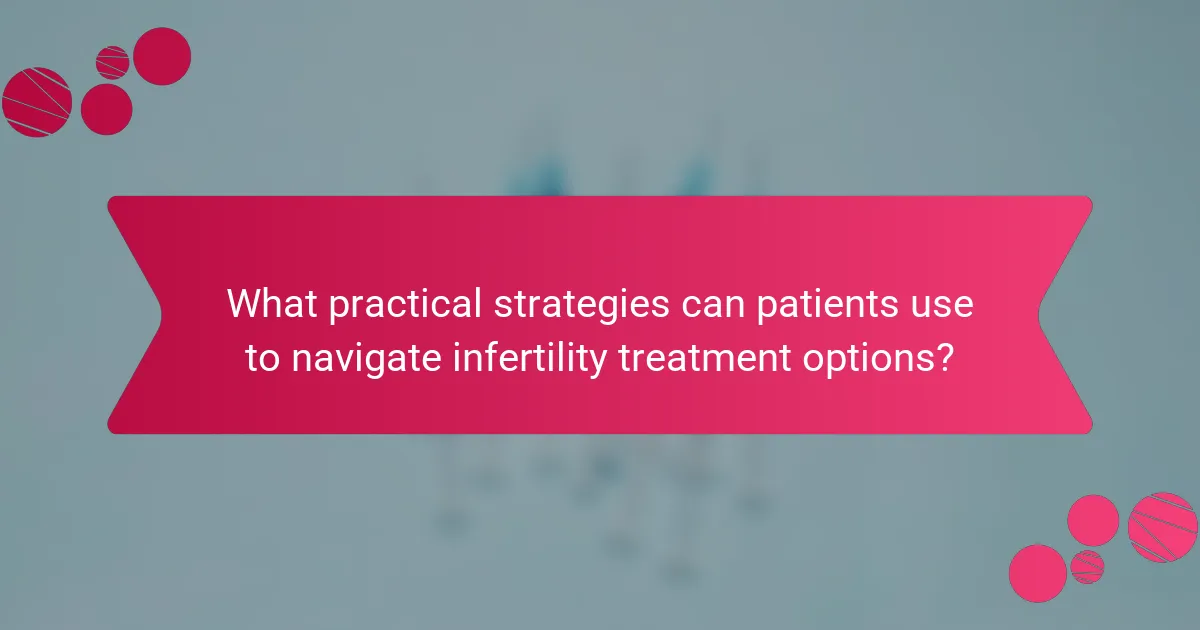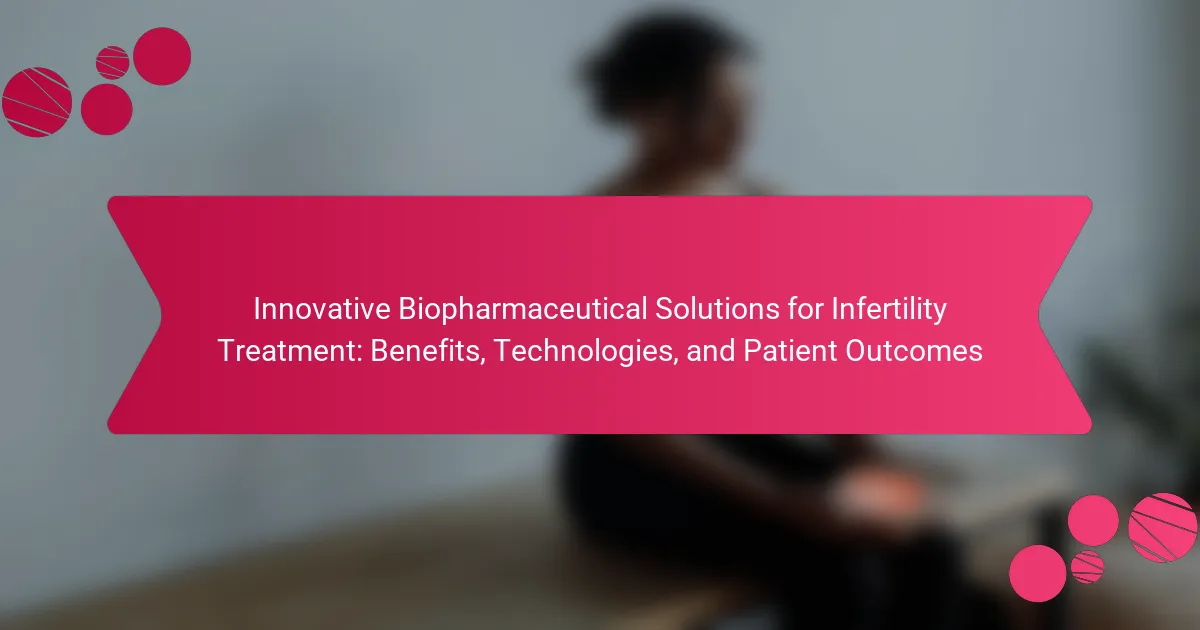Innovative biopharmaceutical solutions for infertility treatment significantly improve success rates and personalize care. Advanced technologies like gene editing and regenerative medicine target specific infertility causes. These methods reduce time to pregnancy and side effects, leading to better patient outcomes. Understanding these innovations can empower individuals in their fertility journey.

What are the key benefits of innovative biopharmaceutical solutions for infertility treatment?
Innovative biopharmaceutical solutions for infertility treatment offer significant benefits, including improved success rates and personalized approaches. These solutions utilize advanced technologies such as gene editing and regenerative medicine, enhancing the chances of conception. Additionally, they often reduce the time to pregnancy and minimize side effects compared to traditional methods. As a result, patients experience better overall outcomes and increased satisfaction with their treatment options.
How do these solutions improve patient outcomes?
Innovative biopharmaceutical solutions significantly enhance patient outcomes in infertility treatment. These advancements lead to higher success rates, reduced time to conception, and improved emotional well-being for patients. Technologies such as personalized medicine and advanced reproductive techniques target specific causes of infertility, resulting in more effective treatments. As a result, patients experience shorter treatment cycles and increased chances of live births, ultimately transforming their reproductive health journey.
What role do personalized treatments play in infertility care?
Personalized treatments significantly enhance infertility care by tailoring therapies to individual patient needs. These treatments utilize advanced biopharmaceutical solutions, improving patient outcomes and satisfaction. For instance, personalized approaches can optimize hormone therapies, leading to higher success rates in assisted reproductive technologies. As a result, patients experience fewer emotional and physical burdens during treatment.
Which specific conditions can be effectively treated with these solutions?
Innovative biopharmaceutical solutions can effectively treat conditions such as unexplained infertility, ovulatory disorders, endometriosis, and male factor infertility. These treatments often improve patient outcomes by enhancing egg quality, regulating hormonal imbalances, and increasing the chances of successful conception. Additionally, personalized approaches using advanced technologies can address unique patient needs, leading to more tailored and effective treatment plans.

What cutting-edge technologies are driving advancements in infertility treatment?
Innovative biopharmaceutical solutions, such as gene therapy and stem cell treatments, are transforming infertility treatment. These technologies enhance reproductive outcomes by targeting underlying causes of infertility. For example, gene editing can correct genetic disorders, while stem cell therapy can regenerate damaged reproductive tissues. As a result, patients experience higher success rates and fewer side effects compared to traditional methods.
How does gene editing contribute to infertility solutions?
Gene editing significantly enhances infertility solutions by targeting genetic causes of reproductive issues. This technology allows for precise modifications in genes, improving embryo viability and increasing success rates in assisted reproductive techniques. For instance, CRISPR-Cas9 can correct genetic mutations associated with conditions like polycystic ovary syndrome, potentially restoring fertility in affected individuals. As a result, gene editing represents a groundbreaking approach in personalized infertility treatments, offering hope to many.
What is the impact of stem cell therapy on reproductive health?
Stem cell therapy can significantly enhance reproductive health by improving fertility outcomes. This innovative approach addresses various infertility causes, offering potential solutions where traditional methods may fall short.
Research indicates that stem cells can regenerate damaged reproductive tissues, leading to improved ovarian function and sperm production. For instance, studies show that stem cell injections can restore hormonal balance and enhance the quality of oocytes and embryos.
Additionally, stem cell therapy has shown promise in treating conditions like endometriosis and polycystic ovary syndrome, which often hinder fertility. As a result, patients may experience higher success rates in assisted reproductive technologies, such as in vitro fertilization.
Overall, stem cell therapy represents a transformative option in infertility treatment, providing hope for individuals and couples seeking to conceive.
Which diagnostic technologies enhance treatment effectiveness?
Innovative diagnostic technologies significantly enhance treatment effectiveness in infertility. Techniques such as advanced imaging, genetic testing, and hormone profiling provide precise insights, allowing for tailored treatment plans. These technologies improve patient outcomes by enabling early detection of issues and optimizing therapeutic interventions. For example, preimplantation genetic testing can identify viable embryos, increasing success rates in assisted reproductive technologies.

What patient demographics benefit most from these biopharmaceutical solutions?
Individuals with specific infertility issues benefit most from innovative biopharmaceutical solutions. These include women with polycystic ovary syndrome, men with low sperm count, and patients with unexplained infertility. Tailored treatments address unique biological factors, enhancing success rates. Additionally, age plays a crucial role; younger patients often experience better outcomes due to improved egg quality and overall health.
How do cultural attitudes influence treatment choices in different regions?
Cultural attitudes significantly influence treatment choices for infertility across different regions. These attitudes shape perceptions of biopharmaceutical solutions, leading to varied acceptance and utilization.
In some cultures, traditional methods may be preferred over innovative treatments due to beliefs in natural processes. For instance, regions with strong community ties may prioritize holistic approaches, impacting the adoption of advanced technologies.
Conversely, in cultures that emphasize scientific progress, patients may be more inclined to embrace cutting-edge biopharmaceutical solutions. This acceptance often correlates with improved patient outcomes, as individuals seek effective treatments tailored to their needs.
Overall, understanding these cultural nuances is crucial for healthcare providers to offer appropriate infertility treatments that resonate with patients’ values and beliefs.
What are the common barriers to accessing these innovative treatments?
Common barriers to accessing innovative biopharmaceutical treatments for infertility include high costs, limited insurance coverage, and lack of awareness. Geographic disparities also affect access, as specialized clinics may not be available in all regions. Additionally, regulatory hurdles can delay the introduction of new therapies. Patients may face emotional and psychological barriers, impacting their willingness to pursue treatment.

How do innovative biopharmaceutical solutions compare to traditional infertility treatments?
Innovative biopharmaceutical solutions offer enhanced efficacy and personalized approaches compared to traditional infertility treatments. These solutions utilize advanced technologies like gene editing and targeted therapies, resulting in improved patient outcomes. Studies show a higher success rate in achieving pregnancy with biopharmaceuticals, often reducing the time to conception. Additionally, these treatments can address specific underlying causes of infertility, providing tailored options that traditional methods may not offer.
What are the cost implications of these advanced solutions?
Advanced biopharmaceutical solutions for infertility treatment can have significant cost implications. The initial investment in these innovative technologies may be high, but they often lead to improved patient outcomes and reduced long-term healthcare costs.
For example, advanced gene therapies and personalized medicine can increase success rates, potentially decreasing the number of cycles needed for successful conception. This efficiency can lower overall expenses associated with infertility treatments. Additionally, these solutions may reduce the need for invasive procedures, which can be costly and carry risks.
Moreover, insurance coverage for these advanced treatments is evolving, affecting out-of-pocket costs for patients. As more data emerges on the effectiveness and safety of these solutions, reimbursement policies may improve, further influencing the financial landscape of infertility treatment.
In summary, while the upfront costs of advanced biopharmaceutical solutions can be substantial, their potential to enhance treatment efficacy and reduce long-term expenses presents a compelling case for investment.
Which side effects are associated with newer treatments?
Newer treatments for infertility may cause side effects such as hormonal imbalances, mood swings, and ovarian hyperstimulation syndrome. These effects vary based on individual responses and specific treatment protocols. Monitoring and managing these side effects are crucial for patient safety and treatment efficacy.

What are the unique attributes of leading biopharmaceutical companies in infertility treatment?
Leading biopharmaceutical companies in infertility treatment exhibit unique attributes that enhance patient care. These attributes include advanced technologies, personalized treatment plans, and strong clinical trial networks.
Many companies leverage cutting-edge genetic screening techniques, improving embryo selection and increasing success rates. They also focus on patient-centered approaches, tailoring therapies to individual needs, which enhances overall satisfaction. Additionally, collaboration with research institutions allows for rapid innovation and access to the latest scientific advancements.
These unique attributes contribute to better patient outcomes and establish a competitive edge in the biopharmaceutical landscape.
Which companies are pioneering research in this field?
Several companies are leading research in innovative biopharmaceutical solutions for infertility treatment. Notable entities include:
1. Ferring Pharmaceuticals – Focuses on hormone therapies and reproductive health solutions.
2. Merck KGaA – Develops advanced fertility medications and technologies.
3. CooperSurgical – Specializes in fertility and surgical solutions for reproductive health.
4. EMD Serono – Innovates in reproductive health with a range of fertility treatments.
5. OvaScience – Pioneers in mitochondrial transfer technology for enhanced fertility outcomes.
These companies are driving advancements that improve patient outcomes in infertility treatment.
What differentiates their approaches to treatment?
Innovative biopharmaceutical solutions for infertility treatment vary significantly in their methodologies. Some approaches emphasize personalized medicine, tailoring treatments based on genetic profiles, while others focus on advanced technologies like in vitro fertilization (IVF) and stem cell therapies. Each method aims to enhance patient outcomes by addressing specific causes of infertility, such as hormonal imbalances or genetic disorders. Unique attributes, such as the use of artificial intelligence for predictive analytics in treatment plans, further differentiate these approaches.

What are the rare but noteworthy advancements in infertility treatment?
Recent advancements in infertility treatment include innovative biopharmaceutical solutions that enhance success rates. Noteworthy developments involve gene editing technologies, such as CRISPR, which target specific genetic issues affecting fertility. Additionally, advancements in personalized medicine allow treatments to be tailored to individual patients based on their genetic profiles, improving outcomes. Another significant progression is the use of artificial intelligence in embryo selection, which boosts implantation success rates. These rare innovations collectively represent a transformative shift in infertility care.
How are artificial intelligence and machine learning being applied?
Artificial intelligence and machine learning enhance infertility treatments by improving diagnostics, personalizing therapies, and predicting patient outcomes. These technologies analyze vast data sets to identify effective treatment protocols. For example, AI algorithms can assess embryo viability, increasing success rates in IVF procedures. Machine learning models also personalize medication plans based on individual patient responses, optimizing treatment efficacy. Furthermore, predictive analytics help clinicians foresee complications, leading to proactive management and improved patient care.
What are the ethical considerations surrounding these innovations?
Ethical considerations surrounding innovative biopharmaceutical solutions for infertility treatment include patient autonomy, informed consent, and equitable access. These innovations must prioritize patient rights and ensure that individuals understand the risks and benefits involved. As a result, transparency in clinical trials and marketing practices is crucial. Additionally, addressing disparities in access to these treatments is essential to prevent inequalities in reproductive healthcare. Ethical frameworks should guide the development and distribution of these technologies to protect vulnerable populations.

What practical strategies can patients use to navigate infertility treatment options?
Patients can navigate infertility treatment options by researching innovative biopharmaceutical solutions, understanding their benefits, and evaluating patient outcomes. First, consult with a fertility specialist who can provide personalized recommendations. Next, explore various treatment technologies, such as in vitro fertilization (IVF) and hormonal therapies, to find the best fit. Additionally, consider joining support groups to share experiences and gain insights from others. Lastly, keep track of treatment progress and outcomes to make informed decisions about future options.
How can patients advocate for their needs in treatment discussions?
Patients can advocate for their needs in treatment discussions by actively participating, asking questions, and expressing concerns. Engaging with healthcare providers fosters a collaborative environment. Patients should prepare by researching innovative biopharmaceutical solutions for infertility treatment, understanding their benefits and technologies. This knowledge empowers them to discuss options effectively, ensuring their preferences and expectations are considered. Additionally, sharing personal experiences can help providers tailor treatments to individual needs, ultimately improving patient outcomes.
What common mistakes should patients avoid during their treatment journey?
Patients should avoid common mistakes such as skipping appointments, neglecting medication instructions, and failing to communicate openly with healthcare providers. These errors can hinder the effectiveness of innovative biopharmaceutical solutions for infertility treatment. Consistent follow-up and adherence to prescribed treatments enhance patient outcomes significantly. Additionally, managing expectations and seeking emotional support are crucial during this journey.
Which resources are available for support and information on infertility treatments?
Numerous resources provide support and information on infertility treatments. Professional organizations like the American Society for Reproductive Medicine offer guidelines and educational materials. Online platforms such as Resolve: The National Infertility Association provide community support and resources. Clinics often have patient education programs detailing available treatments. Additionally, academic journals publish the latest research on innovative biopharmaceutical solutions for infertility, enhancing patient understanding of options and outcomes.
